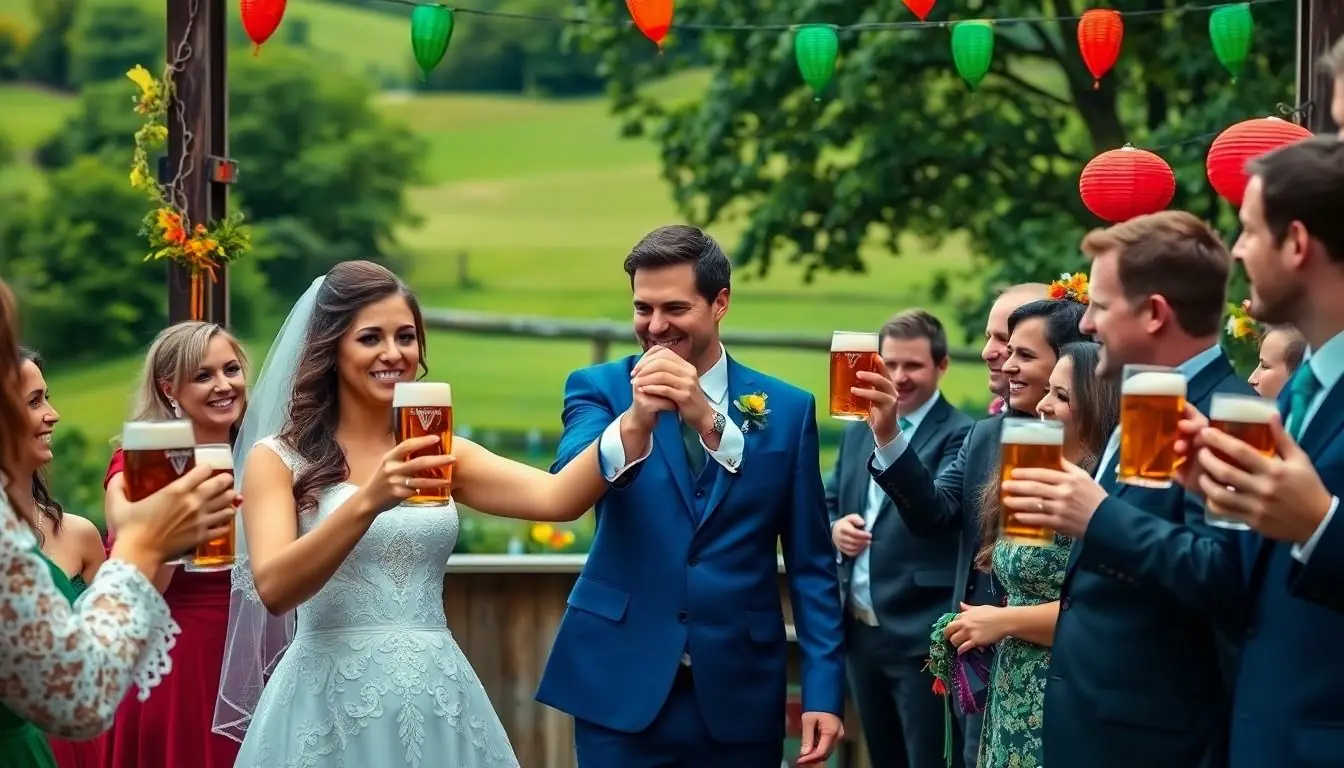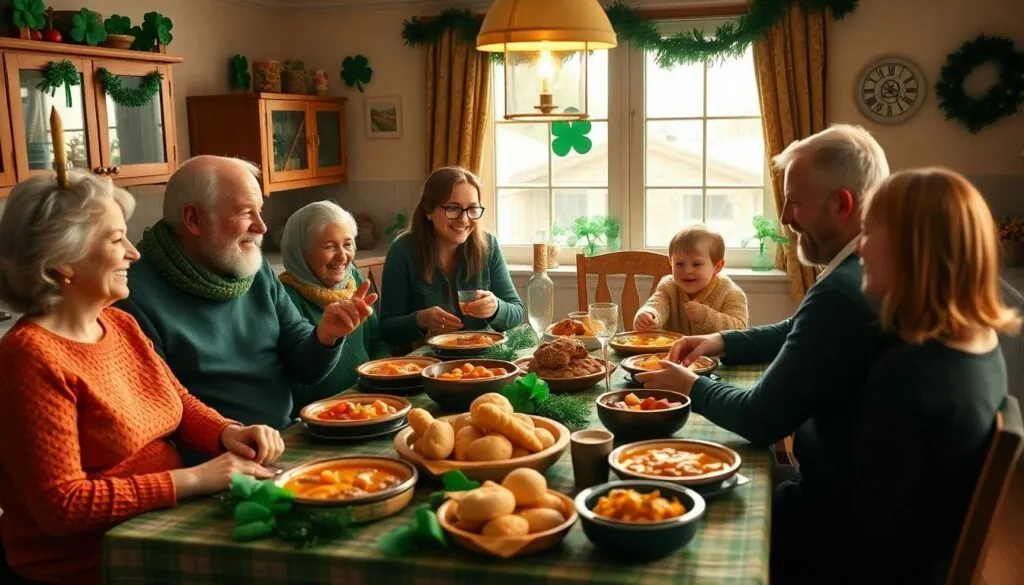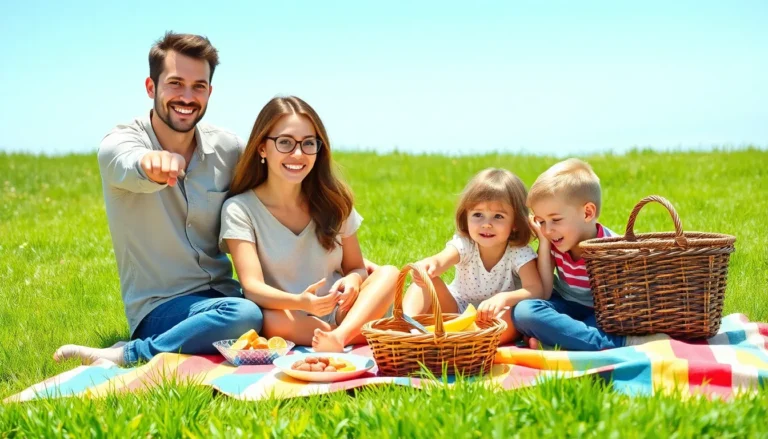Table of Contents
ToggleIrish family traditions are like a hearty stew simmering on the stove—rich in flavor and full of surprises. From lively gatherings filled with music and laughter to the quirky customs that leave everyone scratching their heads, these traditions bring families together in a way that’s uniquely Irish. Whether it’s celebrating St. Patrick’s Day with a splash of green or gathering around the table for a Sunday roast, these rituals weave a tapestry of culture and connection.
Overview of Irish Family Traditions
Irish family traditions encompass a rich tapestry of customs, rituals, and celebrations that promote strong bonds and cultural identity. These traditions play a vital role in everyday family life and special occasions.
Historical Background
Irish family traditions trace back centuries and reflect the nation’s agricultural roots and communal lifestyle. The emphasis on kinship and community emerges from historical struggles, including famine and conflict. Understanding these traditions requires acknowledgment of the migration patterns that influenced them. Many Irish families maintained customs as they settled abroad, adapting while preserving their heritage. The survival of family gatherings and storytelling highlights the importance of connection amidst adversity.
Cultural Significance
Cultural significance of Irish family traditions frequently manifests through shared meals, celebrations, and annual customs. Rituals such as Sunday roasts and holiday observances tighten bonds among family members. Music, dance, and storytelling often accompany these gatherings, reinforcing a sense of belonging. St. Patrick’s Day exemplifies a vibrant celebration uniting families across the globe. Actively engaging in these traditions fosters not just enjoyment but also a shared identity that honors Irish heritage and sustains connections across generations.
Celebratory Traditions

Celebratory traditions play a vital role in fostering connections among Irish families. These customs reflect deep cultural roots and shared values.
Weddings and Marriage Customs
Weddings in Ireland often blend ancient customs with modern practices. Couples might incorporate the tradition of handfasting, where the couple’s hands are bound together symbolically. Celebrants frequently choose outdoor venues to highlight Ireland’s beautiful landscapes. Marriages usually take place in local churches, steeped in community support and connection. Families often enjoy a lavish reception, featuring music, dancing, and traditional Irish fare. Guests frequently toast the couple with a pint of Guinness or whiskey, celebrating love and joy.
Holiday Celebrations
Families in Ireland celebrate numerous holidays with enthusiasm. St. Patrick’s Day stands out as a significant occasion, marked by parades and cultural festivities. Many families gather to enjoy feasts that highlight traditional dishes like corned beef and cabbage. Christmas celebrations often include decorating homes with wreaths and exchanging gifts, emphasizing generosity and kinship. Easter brings unique traditions, such as preparing special baked goods like simnel cakes. Each holiday serves as a reminder of cultural heritage and strengthens family ties through shared experiences.
Culinary Traditions
Culinary traditions play a vital role in Irish family customs. They evoke a sense of nostalgia and togetherness during shared meals.
Traditional Irish Dishes
Traditional Irish dishes reflect the country’s rich agricultural history. For example, Irish stew consists of lamb or beef, potatoes, carrots, and onions, simmered until tender. Potatoes, introduced in the 16th century, became a staple in many meals, promoting hearty, filling fare. Soda bread, another Irish classic, uses simple ingredients and often features buttermilk, creating a distinct texture and flavor. Coddle, a Dublin specialty, combines sausages, bacon, potatoes, and onions in a comforting dish that’s popular for family gatherings. These meals represent more than sustenance; they symbolize heritage, encouraging families to reconnect over delicious, time-honored recipes.
Family Recipes and Gatherings
Family recipes often pass down through generations, preserving culinary heritage. Sunday dinners typically feature traditional dishes, allowing families to bond over shared stories and flavors. Celebrations such as weddings and holidays showcase elaborate feasts, highlighting dishes like roasted lamb and colcannon. Guests enjoy these meals while reminiscing about family history, strengthening relationships. Each recipe carries memories that connect past generations with the present. Family reunions foster culinary exploration, as members bring unique recipes, creating a rich tapestry of flavors on the dining table. Through these gatherings, Irish families celebrate their culinary traditions, honoring their heritage.
Daily Life and Rituals
Daily life in Irish families combines routine activities with meaningful rituals, fostering strong ties and cultural identity.
Roles within Irish Families
In Irish families, roles are often defined by tradition and custom. Parents typically serve as primary caregivers, instilling values in their children. Responsibilities among siblings may vary, with older children often taking on mentorship roles. Extended family members, like grandparents and aunts, maintain close relationships, offering wisdom and support. Respect for elders remains a significant aspect, reinforcing guidance within the family unit. The familial structure adapts over time, but these roles help sustain continuity and connection in everyday life.
Connection to Heritage
Connection to heritage is paramount in Irish families, shaping their daily rituals and interactions. Celebrating cultural milestones helps reinforce identity, maintaining links to the past. Storytelling serves as a vital means of passing down traditions, allowing younger generations to learn about their ancestry. Participation in local festivals keeps cultural practices alive, emphasizing community ties. Families often gather to prepare traditional meals, fostering togetherness while honoring their culinary ancestry. This ongoing engagement with heritage cultivates pride and strengthens relationships among family members.
Modern Adaptations of Irish Traditions
Modern adaptations of Irish traditions reflect the dynamic nature of cultural practices. Families blend old customs with contemporary influences, creating unique expressions of identity.
Influence of Globalization
Globalization significantly impacts Irish traditions. Exposure to diverse cultures encourages families to integrate global practices into their celebrations. For example, many Irish families incorporate international dishes into traditional holiday meals. These new dishes coexist alongside classics like Irish stew and soda bread. Younger generations often embrace technology to connect with far-flung relatives during celebrations. Social media platforms allow families to share experiences in real time, enhancing community ties across distances. This interconnectedness fosters a richer understanding of heritage and promotes a blending of traditions.
Preservation of Traditions
Preservation remains crucial in maintaining Irish family traditions. Many families actively engage in ritual practices that honor their heritage. Gathering for Sunday dinners underscores continuity, with families sharing traditional recipes passed down over generations. Local community events highlight cultural milestones and reinforce familial bonds. Participation in these events ensures younger generations appreciate their roots while adapting to modern life. Furthermore, storytelling retains its power, facilitating the transmission of history and values. This commitment to preserving traditions strengthens cultural identity and nurtures a sense of belonging. Families blend the old with the new while cherishing the past.
Irish family traditions are a vibrant tapestry woven from history and shared experiences. They embody the essence of kinship and community, creating lasting bonds through lively gatherings and cherished rituals. As families continue to celebrate their heritage, they blend time-honored customs with modern influences, ensuring that these traditions remain relevant for future generations.
The heart of Irish culture lies in its ability to adapt while honoring the past. Through storytelling, shared meals, and festive celebrations, families not only preserve their identity but also cultivate a sense of belonging. Embracing these traditions enriches family life, fostering connections that transcend time and distance.







